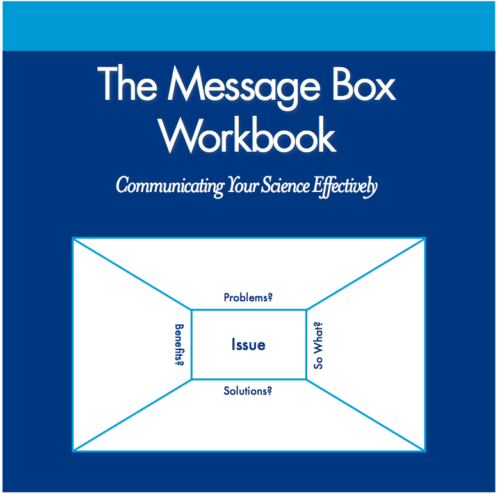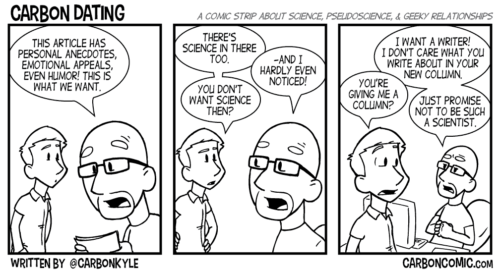The real art of the deal: Lessons in effective science advising
Ana Sosa, Jake Shaner ·Ana Sosa and Jake Shaner
Last week, students in the Science for Environmental Management class took part in an activity, during which class members acted as decision makers and other participating parties in “scenario plays” where science advising was necessary. The goal of this exercise was to determine the best ways to manage our professional roles as both scientists and advisers in decision making.
Some of the characters played by students were water quality experts, town managers, community representatives, professors, deans, and consultants. The scenarios in the plays ranged from a one-on-one conversation to a public meeting full of stakeholders. Even though the situations varied, the common priorities of the exercise were clear throughout: communicate science in a way that reaches a target audience, align different people’s point of views, develop environmental literacy, and avoid any possible misunderstandings or anything that could be considered misconduct.
Through playing the parts of science advisers, we learned a few very important lessons that will become more and more relevant for us in the coming years. As soon as the plays started, it became very clear that the reception of a communicated message will depend on how much the message is adapted to the audience and their perspective1. Science advisers must find the audiences’ priorities and try to build their arguments and language from that, while at the same time making sure to use terms that could resonate with a broader audience2.

We also learned that empathy is key to “disarming people” and removing uneasiness or negative feelings before starting an effective conversation. By recognizing the validity of your audience’s concerns and feelings, you make sure they feel heard and understood, so it is easier to move onto constructive topics. This can be as simple as referencing something they said, or asking questions to make sure to understand the details of what they’re attempting to communicate.
When one has been wrong in the past, it is very important to accept responsibility and promote accountability. This will get rid of any underlying resentment and allow everyone involved to focus on the current problem and its possible solutions. If a science adviser feels like they know everything and they are always right, there is no space for learning and growing; advisers should instead be open to bringing more people into the conversation to get a range of perspectives and other opinions.
As the exercise continued, it also became clear that being prepared for any conversation is crucial for success. There are many tools for developing advising skills, such as The Message Box by COMPASS, described as: “a tool to help you sift through the mountain of information you hold in your head about your work and identify the essential nuggets for your chosen audience.” The Message Box focuses on how to communicate an important issue, and how to identify the problems that derive from it, why people should care, the solutions to the problems, and some of the benefits of solving the problems.

Media training can also be very useful for advisers who are exposed to the press as it can aid in avoiding uncomfortable situations where members of the scientific community can feel pressured to censor what they report for fear of negative repercussions from supervisors or the public. While it is very important to remember that scientists are very passionate and invested in their work, they must to find a way to constructively use passionate language to support their beliefs versus getting upset and using offensive language3.
Being at the early beginnings of careers in the sciences, students in our class might still lack experience, but by using some of these tools, we learned how to start developing the skills we will need in the future for thoughtful science communication. And, as was discussed in class, there is no way to compensate for lack of experience. Emotional intelligence and scientific advising skills can be of great help for us in preparing to take on any conversation, from day-to-day interactions, to public meetings and even press conferences. After these “scenario plays,” we will be prepared for any situation where we need to stick to our beliefs and not let go of our ethics and scientific knowledge, but still keep an open mind and an equal hunger for learning and communicating.

References
1. Feliú-Mójer, M. (2015) Effective Communication, Better Science. Published on Scientific American guests blogs.
2. Bowater, L., & Yeoman, K. (2013). Science communication: a practical guide for scientists. Chichester: Wiley-Blackwell.
3. Wilson, A. (1998) Handbook of Science Communication. CRC Press.
Next Post > Practical visual literacy for science communication
Comments
-
Annie Carew 8 years ago
Great job, Ana! I think you did a great job summarizing an activity that covered a lot of issues. This exercise feels particularly relevant in today's political climate. I think it's important for scientists to be more personable while maintaining credibility, which is a difficult line to walk, as we found out. This was a really great exercise in science dialogue, and laid the foundation for skills we'll use throughout our careers.
-
Alterra Sanchez 8 years ago
Great job! This blog does a wonderful job at bringing together all the things one should consider when advising for science and policy. I especially appreciated the "disarming" comment. That is important because often times that is the main and first block. Before our audience can even begin listening to us, we have to establish trust and comfort.
-
Hao Wang 8 years ago
Nice blog. From the blog and also the process in the class, I realize that determining the best ways to manage our professional roles as both scientists and advisers in decision making are very important. It will help us to understand the other part and make the deal more available.
-
Stephanie Barletta 8 years ago
In your blog you said "empathy is key" which is so true and yet so often forgotten. We are all very passionate about our work and so can often lose sight of our opponents humanity. In fact, we too often see the other side as just that- opponents. They are not opponents or enemies, they are policy makers, stakeholders, and most importantly they are fellow passionate hard working people just like us, and they deserve both our respect and empathy. I think that conflict resolution and policy making is very dependent upon maintaining empathy for eachother, so I was glad to see you highlight that.
-
Juliet Nagel 8 years ago
Great blog, and I truly enjoyed last week's class. The role-playing exercises were fascinating and a great way to think about issues from someone else's viewpoint. That is something we could all benefit from doing more often!
A theme that has run through every class thus far is how to take the knowledge we have as scientists and share it with the rest of the world. The cartoon you posted in your blog shares a point that Don made during our class. When communicating with the public, "don't be such a scientist." Think in different ways about how you can present the reasoning and evidence. Getting your point across is not a simple as stating the numbers or results, science communicators also need to be good listeners. -
Kavya Pradhan 8 years ago
Great job on the blog! I really liked how you were able to hone in on the major points of our conversation. I really think the point about using empathy to "disarm people" is an important one. Scientists are often portrayed as beings without any feeling in popular media and, especially while communicating with the public at large, it sounds like a good idea to show some humanity. I would add that in a lot of the scenarios we played through, there was an element of compromise on part of both the stakeholder and the scientist and it was a good reminder (for me) that the compromising is sometimes the only way to go.
-
Katie Martin 8 years ago
I liked your point about media training and the difficulties surrounding balancing personal desire to present information one way, employers' protocols, and public response. Knowing how to talk to the media is especially important with topics that the media likes to portray as controversial (e.g. climate research, some medical topics, some sociology fields). The linked website emphasizes message clarity in every reason for media training, which ties back into exercises like "The Message Box". Good job, Ana!
-
Ginni La Rosa 8 years ago
This blog entry does an excellent job of synthesizing the main take-home points from our role-playing exercise. More than ever, I realize how crucial it is for science students to gain as much communication experience as possible. These types of scenarios should be practiced in undergraduate environmental science courses as well, and perhaps even in high school. Such skills will especially be advantageous for career prospects.
-
Qiurui Zhu 8 years ago
Good blog. For scientists, reaching a broader audience or communicating effectively with stakeholders requires using a common and easy-to-understand language. As we always said, a real expert/master is who can present complicated things in a simple way. Although we are still lacking enough experience in science advising, at least this scenario play helped us gain some experience more or less.
-
Dylan Taillie 8 years ago
Great blog, Ana! I'm not exactly sure if I am prepared for any situation, but I do feel like the scenarios brought up a lot of possible conversation lines whereI wouldn't have thought the dialogue would lead, and I would highly recommend these scenarios as a preparation tool for science advisers. I also thought that your point of scientists being more open to bringing many diverse perspectives into a conversation is an important one, and it could possibly be amended to say scientists should actively pursue the inclusion of diverse perspectives even if that means including money in grants to get them to the table, it will produce a more beneficial outcome in the end
-
Hadley McIntosh 8 years ago
Really great blog and I think it is HIGHLY relevant this week as climate scientists were put "on trial" at the US House of Representatives Committee on Science, Space and Technology hearing on climate-science. Having a message that is clear, concise and is able to be relevant to the audience is key in making an impact. Obviously that meeting was meant to highlight the uncertainties in our knowledge of climate change, but the spokesperson for climate science did so in a well versed manner.

